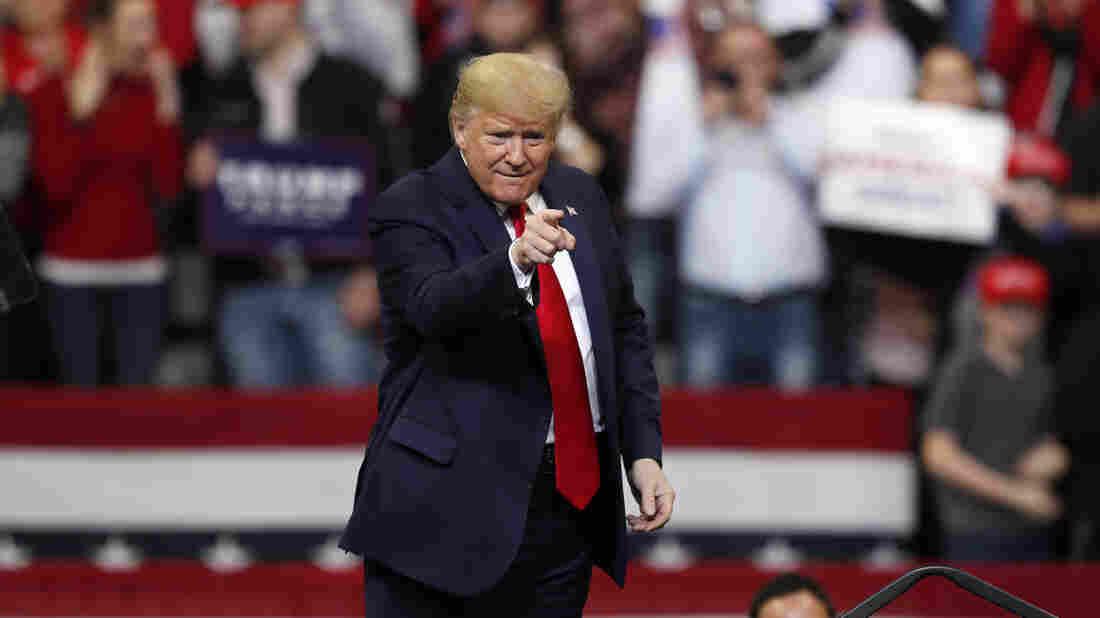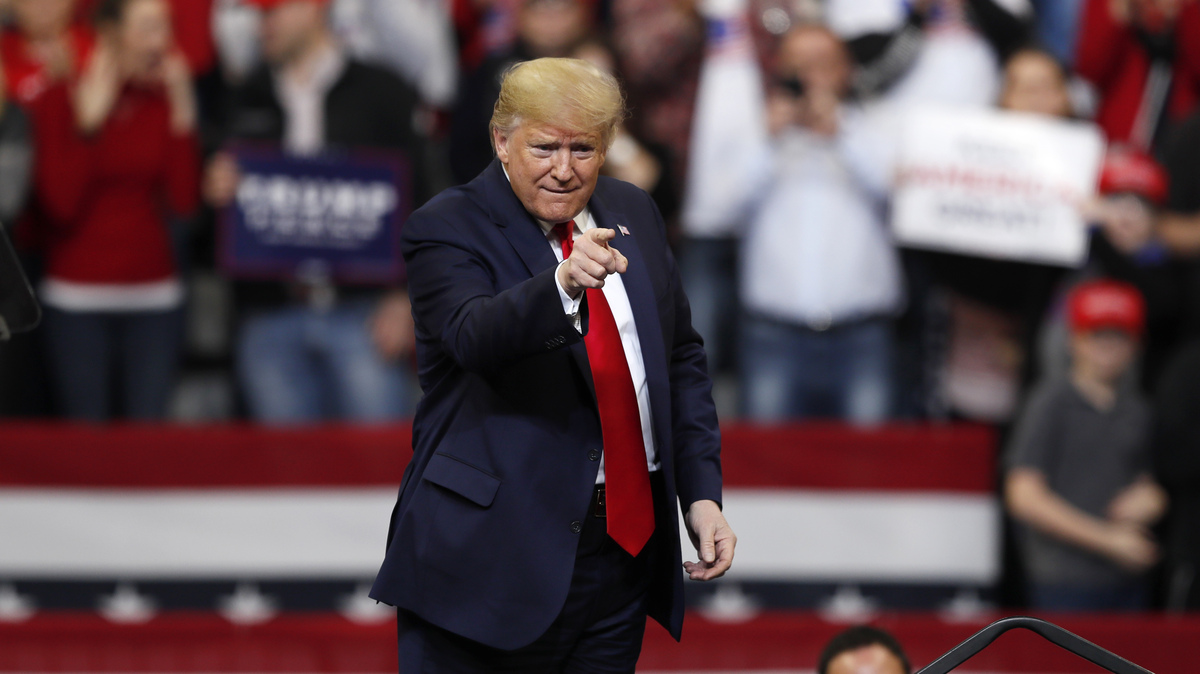
President Trump arrives at a campaign rally at Drake University in Des Moines, Iowa this week. Charlie Neibergall/AP hide caption

President Trump arrives at a campaign rally at Drake University in Des Moines, Iowa this week.
Charlie Neibergall/APMore than anything, this election is about President Trump.
For most incumbent presidents running for re-election, approval ratings really matter. With Trump, there are several different striking ways to look at those numbers. He's historically unpopular, the most unpopular incumbent ever to stand for re-election.
He has a very locked-in base, with sky high approval in his own party. But those who strongly disapprove of Trump outnumber those who strongly approve. Likewise, no modern president has had such high numbers of people who say they will definitely vote against him for re-election.
There is tremendous intensity that motivates Trump's supporters and opponents. Despite the many advantages he has (more on that later...), he is incapable of sticking to a message that highlights those benefits. For every tweet about the great economy, there's another that picks a fight with a movie star or retweets something offensive. Trump remains impulsive and undisciplined — something he thinks works great for him, even though many Republicans (privately) disagree.
Trump also enjoys particular structural advantages, starting with the Electoral College. He received 3 million fewer votes than Hillary Clinton in 2016 and only won 46% of the popular vote, a smaller percentage than what Mitt Romney received when he lost to Barack Obama in 2012.
But America picks its presidents in a state-by-state, winner-take-all system, and Trump's voters are more efficiently distributed among battleground states than Democrats'. So how big of an advantage does he have going into 2020? One way to think about it is that Trump could lose Michigan and Pennsylvania, but still win by holding on to all the other states he won in 2016.
Some estimates say he could lose the popular vote by as many as 5 million votes and still win the Electoral College.
Also, Trump has the advantage of incumbency. There have only been two incumbent presidents to lose in the last 30 years: George H.W. Bush and Jimmy Carter — and they were facing a recession and hostage crisis, respectively. All the tools of the presidency are at Trump's disposal, including an early start on fundraising, and he commands the bully pulpit — and dominates news coverage — like no other president.
Democrats' choice
While Democrats might hope that Trump is so unpopular that a ham sandwich could beat him, that is not the case. The Democrats' choice for a nominee matters, because an election is not just a referendum on the incumbent; it's a binary choice between two candidates.
Donald Trump and others who want him re-elected (foreign and domestic) will be putting tremendous time, effort and billions of dollars into demonizing the Democratic nominee. And the president encourages these efforts, including his open calls for Ukraine and China to investigate Joe Biden.
This year, despite the Democrats' overwhelming enthusiasm for defeating Trump, no Democratic candidate currently running looks like a slam dunk against him. And that's why the Democratic primary race is so unsettled. The weaknesses of the Democratic candidates that Trump can exploit are already well known: from Warren's claims of Native American ancestry and Sanders' socialism, to Biden's age (and, yes, Ukraine) and Buttigieg's inexperience.
Trump has mega bucks to spend, but often overlooked is that the amount the Democratic candidates have raised as a group was twice as much as Trump raised in the last quarter. That shows how much grassroots enthusiasm Democrats could tap into if and when they unify behind one candidate. This year there's the rare possibility that the challenger will not be outspent by an incumbent. Another reason that might be the case this year is Mike Bloomberg.
Even though he's unlikely to become the nominee, the former New York City Mayor says he will spend up to $1 billion to defeat Trump, even if the nominee is a left-wing candidate like Sanders or Warren.
The economy and capitalism
Every presidential election revolves around this simple question: Are you better off now than you were four years ago? For most people — at least in terms of the economy — the answer is yes. Unemployment has continued to tick down the last few years, and the stock market is booming. Gross domestic product growth is not what Trump wanted, but fears of a recession have not materialized. And notably, wages have risen faster for low-income workers since 2018 than for others.
One unusual factor of Trump's presidency is that his approval has not tracked with the economy in the same way it did for other presidents. But, it remains Trump's greatest strength and Democrats' greatest challenge.
It's likely Democrats will focus on how the economy should provide more broadly shared prosperity and better economic mobility, like it used to do. And they'll raise structural issues. Economic disparities are extreme. The top 1% holds nearly as much wealth as the middle class and upper-middle class combined.
Trump touts historically low unemployment rates for Hispanics and African Americans, but the racial wealth gap has expanded for decades. And base costs for big-ticket items like college, health care, housing and retirement continue to rise. The Democrats will focus on middle-class families' anxieties about the future — even if things seem OK in the present for many. Indeed, a growing number of people no longer believe in the American Dream: work hard, play by the rules, and your kids can do better than you did.
Trump will counter that Democrats are socialists who will raise taxes. That argument will be stronger if Sanders — an avowed democratic socialist — is the Democratic nominee. He summed up his economic identity in October 2019: "There are differences between Elizabeth [Warren] and myself. Elizabeth ... has said that she is a capitalist through her bones. I'm not."
Socialism has a clear negative connotation to many in the electorate, and Republicans use "socialism" as a dirty word, but it's not among younger voters — the heart of Sanders' base in the Democratic Party.
Still, this debate is occurring at a time when trust in institutions, public and private, remains in the basement. So it's a challenge for Democrats' argument that giving government a much bigger role in the economy is a good thing.
The culture war
It's possible this will not be an "it's the economy, stupid" election, but an "it's the culture, stupid" election.
Despite his bragging on the economy, Trump is a culture warrior at heart and plans to run another us against them campaign, ratcheting up the grievance among his base against east coast liberal elites, the media, immigrants and kneeling black athletes.
For many of his supporters — farmers, white evangelicals, non-college rural voters, for instance — economics takes a back seat to the cultural issues Trump champions, including immigration, abortion, school prayer and gun rights.
For many Republicans, the number of conservative judges Trump has nominated — and Mitch McConnell has pushed through the Senate — is a key accomplishment of the administration. So are the steps to limit migration at the southern border, reduce refugee resettlement, and enact travel restrictions from an increasing number of countries.
Trump will surely continue to train his ire at the news media, as well. This remains a rallying cause for his base.
Who shows up
Every election is determined by who goes to the polls. This year, the shape of the electorate is harder to discern than ever, because it's likely we'll see a historically large number of voters. Democrats hope it's like 2018, when turnout surged among Democratic-leaning groups: Latinos, young voters and, especially, college-educated women.
Trump, on the other hand, is counting on being able to bring out many more of his core voters — the white working class — who did not show up in 2016. He's using his massive campaign apparatus, including social media, to identify them and try to persuade them to turn out. There was skepticism that Barack Obama could replicate the turnout among key parts of his base when he ran for re-election, but the turnout rate for black voters increased from 2008 to 2012. And since the overall turnout rate in 2016 was about 60%, both sides have more potential voters to tap.
Also, while the electorate continues to get younger, browner and more female, a lot of those voters live in the wrong states as far as Democratic hopes at winning go. In other words, it doesn't matter as much if there's is a huge surge in turnout in California and New York (two states where Hillary Clinton got one-fifth of all her votes from); it matters who shows up in Michigan, Pennsylvania and Wisconsin. In Michigan and Pennsylvania, white, working-class voters make up 56% of eligible voters; in Wisconsin, it's 61%.
And that is why Democrats are spending so much energy on voter-registration drives and on fighting voter suppression efforts by Republicans. Ballot access is a top priority for Democrats. It was among the first priorities they focused on when they took over the majority in the House in 2019.
2020-02-02 10:00:00Z
https://news.google.com/__i/rss/rd/articles/CBMiTGh0dHBzOi8vd3d3Lm5wci5vcmcvMjAyMC8wMi8wMi84MDE5NDY1MjEvd2hhdC10aGUtMjAyMC1lbGVjdGlvbi1pcy1hbGwtYWJvdXTSAQA?oc=5
Read Next >>>>
Bagikan Berita Ini




















0 Response to "What The 2020 Election Is All About - NPR"
Post a Comment